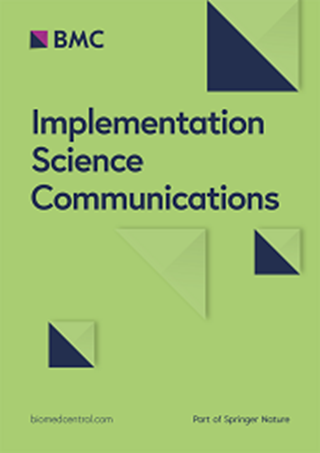减少出院时过度使用抗生素的参与式定制方法平行分组随机试验方案:ROAD home 试验
IF 8.8
1区 医学
Q1 HEALTH CARE SCIENCES & SERVICES
引用次数: 0
摘要
出院时过度使用抗生素的现象十分普遍,成本高昂且有害。虽然针对出院的抗生素监管干预措施很有效,但这些措施需要大量资源,对于资源有限的医院来说往往不可行。这一弱点影响了监管干预措施的普及性,并对健康公平产生了影响,因为并非所有患者都能根据其接受治疗的地点获得监管措施的益处。改善出院抗生素处方可能有不同的途径,其可行性也大相径庭。支持医院选择适合其具体情况的干预措施可能是一种有效的方法,可在不同医院中切实减少出院时抗生素的过度使用。本研究旨在评估 "减少出院时抗生素过度使用家庭"(Reducing Overuse of Antibiotics at Discharge Home)多组分实施策略("ROAD Home")对社区获得性肺炎和尿路感染患者出院时抗生素过度使用的效果。这项为期 4 年的双臂平行分组随机试验将包括三个阶段:基线(23 个月)、干预(12 个月)和干预后(12 个月)。从密歇根州医院医疗安全联盟(Michigan Hospital Medicine Safety Consortium)招募的 40 家医院将进行协变量约束随机分配,一半医院被随机分配到 ROAD Home 实施策略中,另一半医院被随机分配到 "管理如常 "对照组中。ROAD Home 以 "促进医疗服务研究实施行动 "综合框架为指导,包括:(1)基线需求评估,以创建一套量身定制的潜在监管干预措施;(2)在选择实施干预措施时进行辅助决策;(3)按照实施蓝图进行外部促进。主要结果是出院时抗生素过度使用的基线调整天数。次要结果包括 30 天的患者疗效和抗生素相关不良事件。混合方法并行过程评估将确定影响定制干预措施实施的背景因素,并评估包括可接受性、可行性、忠实性和持续性在内的实施结果。不同医院的资源各不相同,要减少出院时抗生素的过度使用,就需要量身定制干预措施。本试验将评估一项多成分实施策略是否能帮助医院根据当地情况选择循证管理干预措施,从而减少出院时抗生素的过度使用。这项研究中获得的知识可为今后在不同医院实施监管措施提供参考,并促进公平享受质量改进措施带来的益处。Clinicaltrials.gov NCT06106204 on 10/30/23本文章由计算机程序翻译,如有差异,请以英文原文为准。
Protocol for a parallel cluster randomized trial of a participatory tailored approach to reduce overuse of antibiotics at hospital discharge: the ROAD home trial
Antibiotic overuse at hospital discharge is common, costly, and harmful. While discharge-specific antibiotic stewardship interventions are effective, they are resource-intensive and often infeasible for hospitals with resource constraints. This weakness impacts generalizability of stewardship interventions and has health equity implications as not all patients have access to the benefits of stewardship based on where they receive care. There may be different pathways to improve discharge antibiotic prescribing that vary widely in feasibility. Supporting hospitals in selecting interventions tailored to their context may be an effective approach to feasibly reduce antibiotic overuse at discharge across diverse hospitals. The objective of this study is to evaluate the effectiveness of the Reducing Overuse of Antibiotics at Discharge Home multicomponent implementation strategy (“ROAD Home”) on antibiotic overuse at discharge for community-acquired pneumonia and urinary tract infection. This 4-year two-arm parallel cluster-randomized trial will include three phases: baseline (23 months), intervention (12 months), and postintervention (12 months). Forty hospitals recruited from the Michigan Hospital Medicine Safety Consortium will undergo covariate-constrained randomization with half randomized to the ROAD Home implementation strategy and half to a “stewardship as usual” control. ROAD Home is informed by the integrated-Promoting Action on Research Implementation in Health Services Framework and includes (1) a baseline needs assessment to create a tailored suite of potential stewardship interventions, (2) supported decision-making in selecting interventions to implement, and (3) external facilitation following an implementation blueprint. The primary outcome is baseline-adjusted days of antibiotic overuse at discharge. Secondary outcomes include 30-day patient outcomes and antibiotic-associated adverse events. A mixed-methods concurrent process evaluation will identify contextual factors influencing the implementation of tailored interventions, and assess implementation outcomes including acceptability, feasibility, fidelity, and sustainment. Reducing antibiotic overuse at discharge across hospitals with varied resources requires tailoring of interventions. This trial will assess whether a multicomponent implementation strategy that supports hospitals in selecting evidence-based stewardship interventions tailored to local context leads to reduced overuse of antibiotics at discharge. Knowledge gained during this study could inform future efforts to implement stewardship in diverse hospitals and promote equity in access to the benefits of quality improvement initiatives. Clinicaltrials.gov NCT06106204 on 10/30/23
求助全文
通过发布文献求助,成功后即可免费获取论文全文。
去求助
来源期刊

Implementation Science
医学-卫生保健
CiteScore
14.30
自引率
11.10%
发文量
78
审稿时长
4-8 weeks
期刊介绍:
Implementation Science is a leading journal committed to disseminating evidence on methods for integrating research findings into routine healthcare practice and policy. It offers a multidisciplinary platform for studying implementation strategies, encompassing their development, outcomes, economics, processes, and associated factors. The journal prioritizes rigorous studies and innovative, theory-based approaches, covering implementation science across various healthcare services and settings.
 求助内容:
求助内容: 应助结果提醒方式:
应助结果提醒方式:


